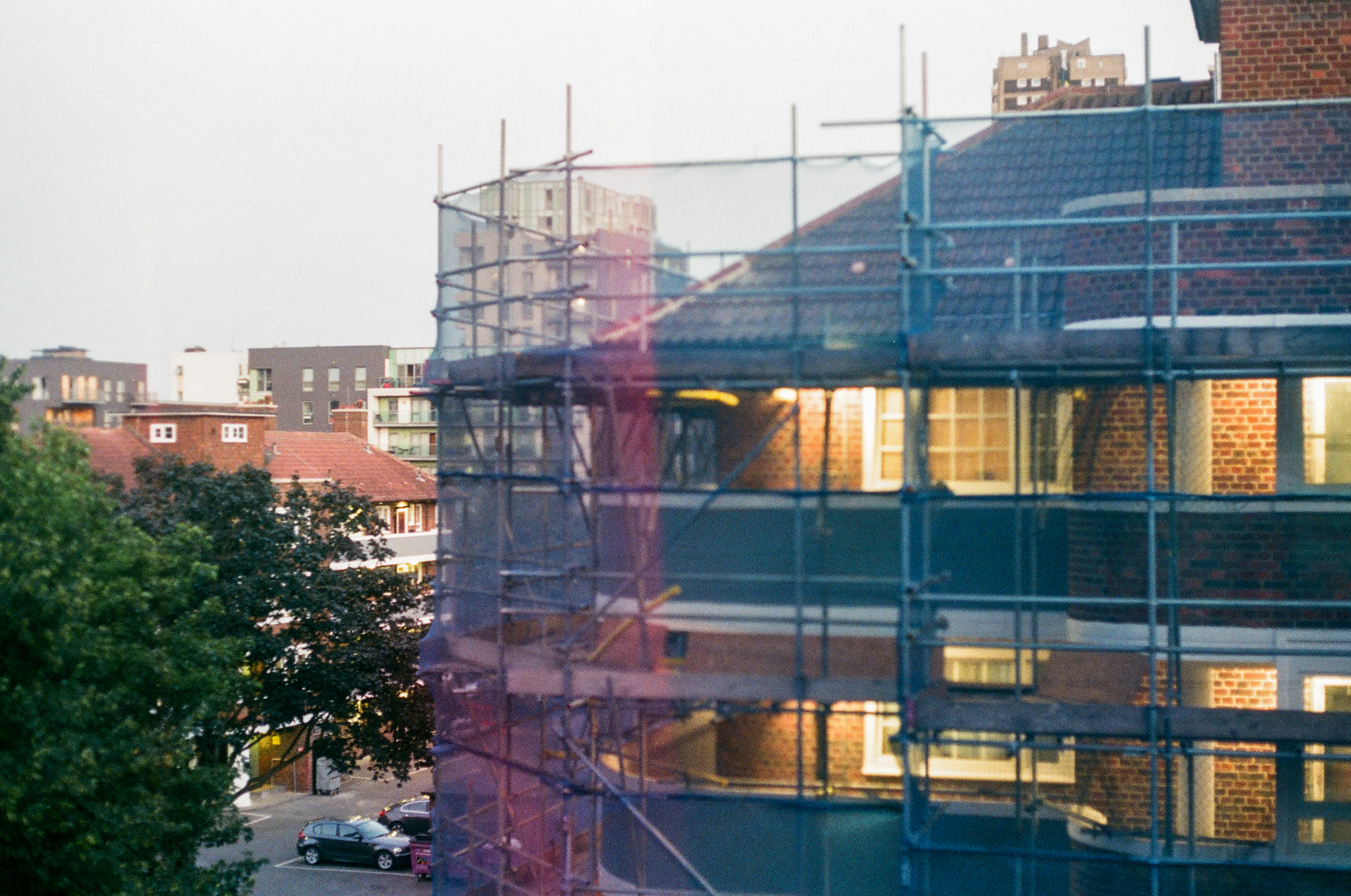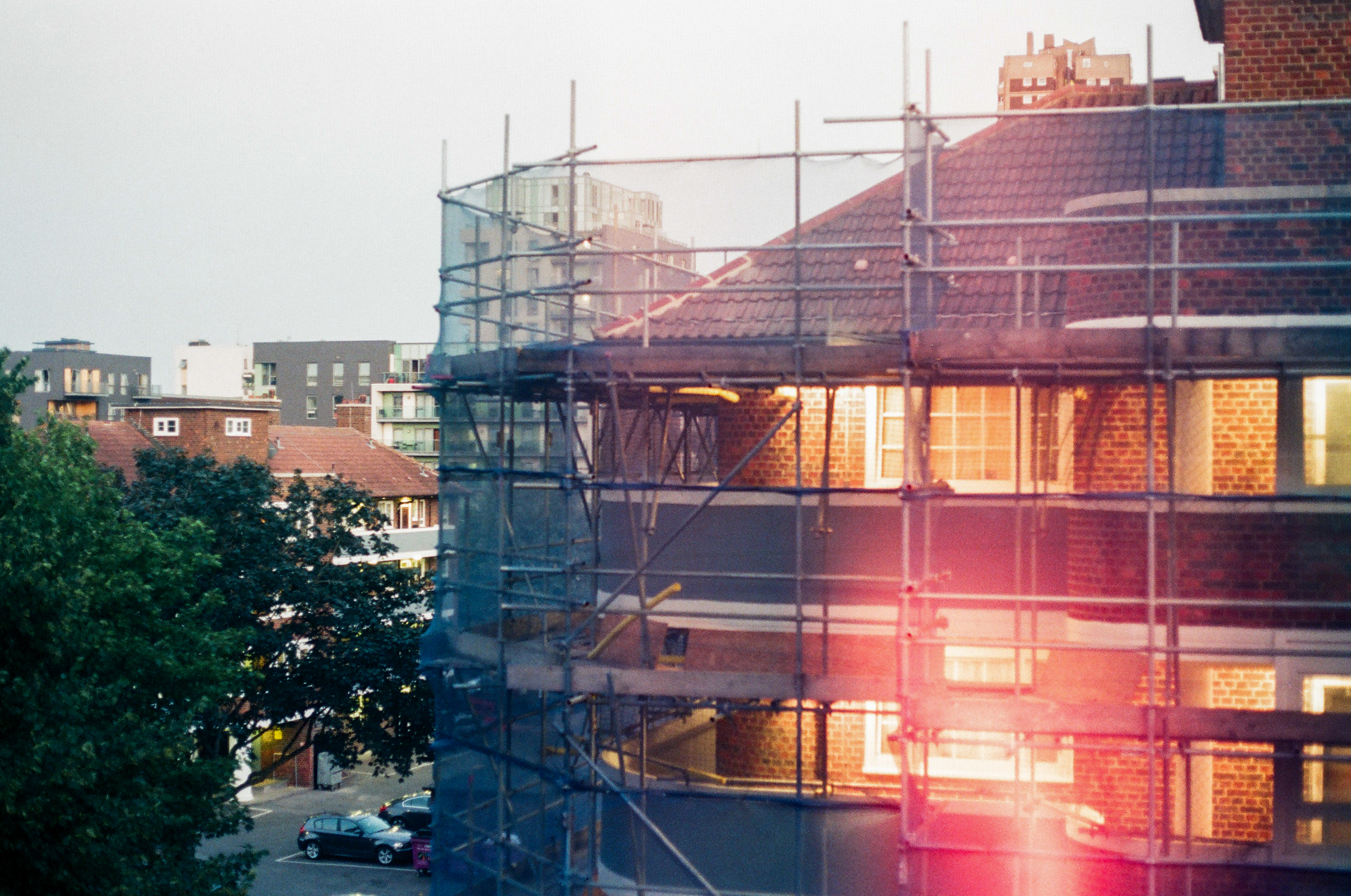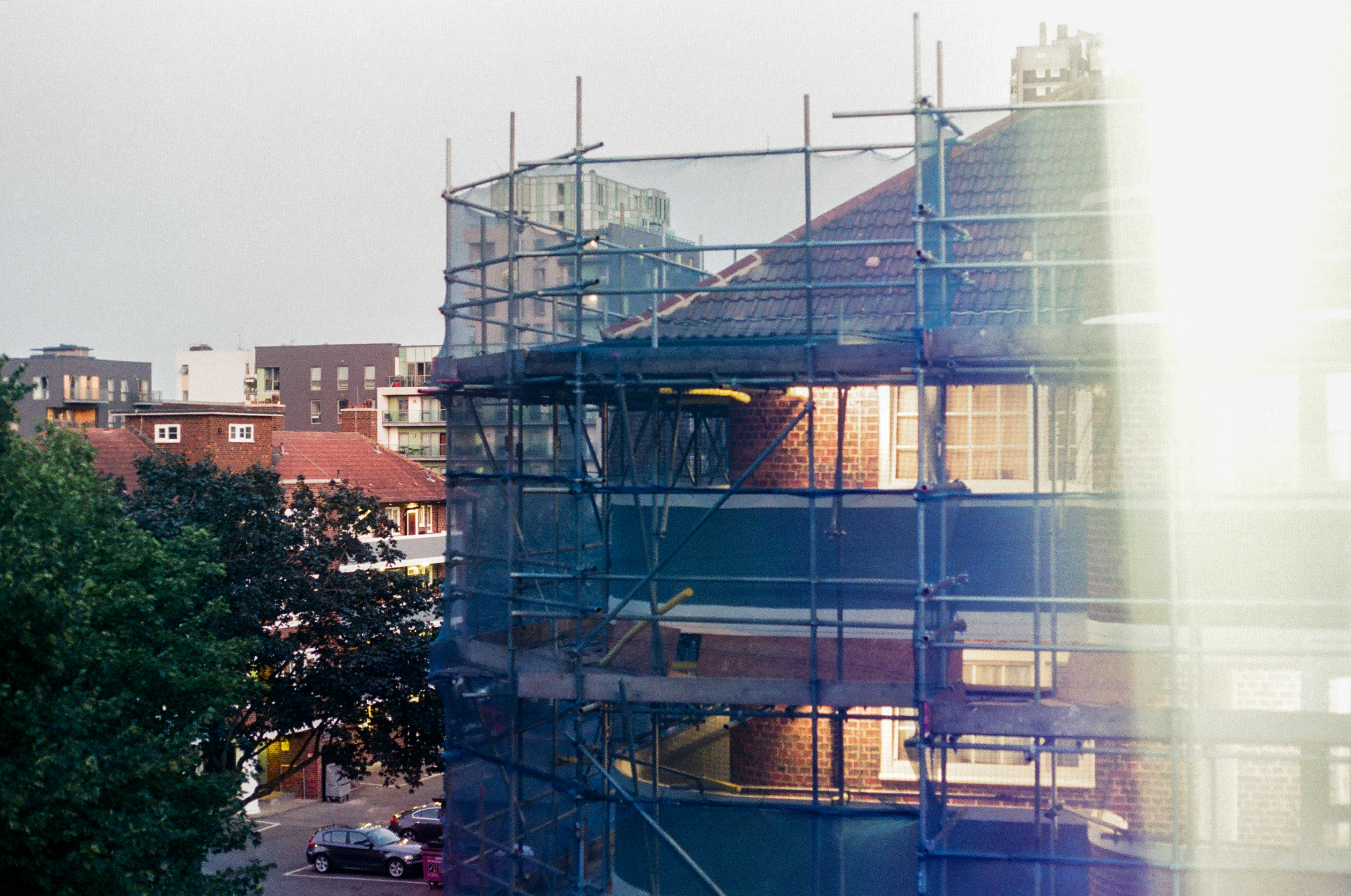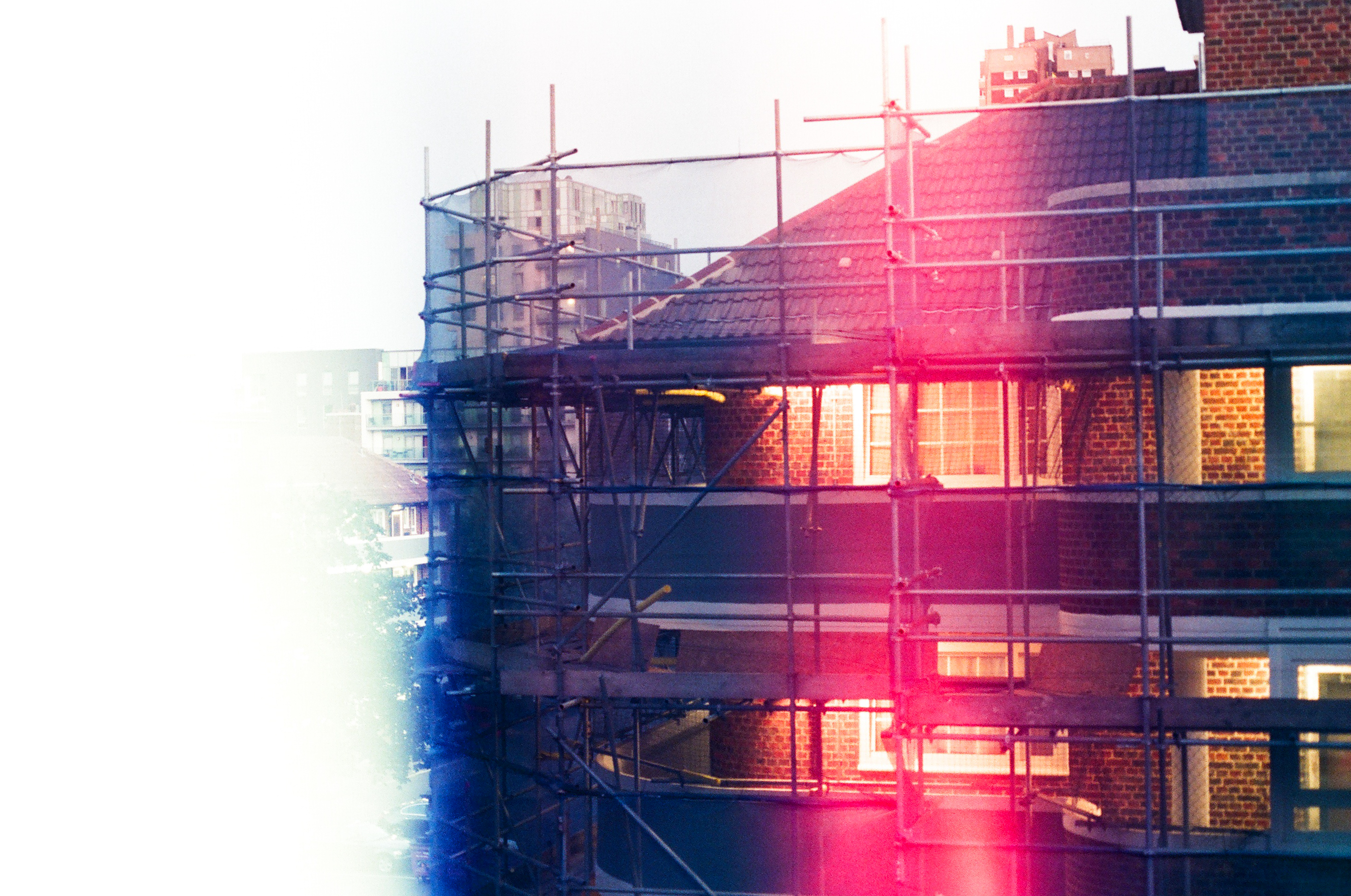Incidents That Smell of Ethanol

WEDNESDAY, 23rd SEPTEMBER
‘I’m gonna need you to go to site later and check out these condensers, see if we can duct them to the façade, and where the make-up air will come from, probably need an attenuator. They wanna blank out the louvres with some sandwich board for the acoustic report. You got someone at C—e? Speak to him, see if you can get a selection. But I need it sorted out.’
First trip out of the office since the resumption of normal working hours. The mood amongst the staff was rock-bottom; against the government’s advice—that we all go back to working from home—the directors had sent around a memo, categorically stating that we were not to work from home, but were to be in every day at eight-thirty latest. Everyone—family, friends & colleagues—told me that I should not respond to the memo, and so, reluctantly, I heeded their advice. They knew what I was like: my mother told me I would lose my job if I spoke out; my friends told me the directors would get personal and attack me if I spoke out; colleagues told me it would be funny but that I really should not speak out. I bit my tongue. I sat at my desk, cursing, boiling with rage. Many staff spoke out, replied, returned their thoughts and concerns, and were delivered the copied response—'I have explained in my subsequent e-mail that your interpretation is completely incorrect.’ Morale sunk lower than it had already been. I walked past the director in question and shouted—‘It’s like a fuckin morgue in here!’ A cry came from the other side of the room—‘It will be soon!’ I laughed, everybody laughed. He did not flinch; I dared him to.
It would be good to get out of the office. The day turned and a fine drizzle fell through the warm city air. I was running late, but the pavements were clear and I was able to walk quickly. Bank station had a one-way system imposed upon it, turning even more labyrinthian, a real trial, narrow walkways and escalators burrowing deeper into the earth below the Bank of England, a land without sun, all organisms subsisting on what was brought down from above. A large part of me was nervous; I had not been on this journey since before lockdown, and it would revive in me many memories I no longer wished to confront. Six minutes for the DLR to Woolwich Arsenal. Masks mostly but not everywhere. I sat at the window, next to a sign telling me to keep my distance; it obscured my view. My shirt was tight, my throat, I perspired. We ricketed up through the tunnel and came to the daylight. I swallowed hard. The rain had stopped. Everything shone but it was not new. I was eye-to-eye with the old buildings of my neighbourhood, getting closer to where I lived, recognising everything, and, within a moment, being able to tie every street and pub and restaurant and path to a memory. Craning my head this way & that, I looked past the keep-your-distance sign, between the brick alleyways to see my apartment building, my home, vacant now for six months and ten days. I sighed and looked at the floor. I felt the blood rush to my cheeks. It seems so long ago, as Cohen would say. It seemed longer ago than that. It seemed longer than lately, longer than a lockdown, longer than life. A pain caught in my chest. I counted the stations, I looked at the buildings where my friends lived, the places we had drank and been drunk. I was in another country in another time. I took to my feet and they carried me down from the Canning Town platforms, down, under then up and the rain was falling again. A stiff wind came off the Thames, tearing hair of everyone who was waiting to cross the road.

It was the first time I had been to site since I came upon a simple loveletter H—n had secretly stowed in my coat pocket. That played on my mind without interruption; every act I committed was an effort to not remember what I wanted to forget. Previously I had invited A—n to join me, knowing that his company would be a distraction, but he was still in a foul mood from the earlier memo and did not want to do anything. How could anyone blame him? I walked along in the rain, cowering a cigarette underneath my palm. The man at the security gate recognised me—how surprising!—and let me in, no problem. I walked up the three flights of stairs and at the top of them I was dripping with sweat, out of breath and upset at having dropped a packet of cigarettes somewhere along the way. It was my first time meeting this gentleman. He had an office on the top floor and was imposing enough on the phone. I walked into his office; I could not shake his hand. He sat at his desk and asked me questions. I stared out of the window at the workshops and factories and estates in the rain and did my best to answer them. He would not walk me round site—he had an important meeting to attend—but I should secure the presence of someone else, carry out the survey and report back to him afterwards.
The site had progressed, although not to the degree I had expected. Six months had passed, smack in the middle of two equinoxes. The sky was as dim then as it was now. The sky appeared brighter then than it did now. I did my thing, marked-up the drawing and carried it back to the gentleman’s desk on the third floor. He was on the phone. I put it on top of a stack of documents and he told the person on the other end to hold for a moment—‘All sorted?’ I told him that I thought so. ‘You gotta go?’ I did. ‘I’ll give you a call in a bit or in the morning.’ I said good-bye.
The rain was still falling. If things went smoothly I would be able to intercept the usual train back to my parents. My hands smelled of ethanol. My mouth tasted of death! The Jubilee line was busy and Stratford station with it; the latter had also turned into a one-way system that I circled—having bought a coffee—three times before I made my way to the correct platform. I caught my breath, lifted my arms, evaporated all the gunk off me. There was a girl at the end of the platform. I watched her. She had the same shoes as H—n. She was texting. She danced a little jig every now & then. She looked around at the scenery then back to her texting. Her legs were slender like H—n’s and she wore all black like H—n. I stared at her and then turned away. I looked at the rain coming down on me. The train was due in fifteen minutes. The coffee was so hot against the wind that stripped along the tracks and did not touch the mouth. She was captured by her texts. I looked at her till it stung, till it stung like the sunrises. Four minutes late, quieter after the government’s announcement, dull and still, tired. I took a pair of seats to myself and drank my coffee. I looked at the rain and thought of Austerlitz, thought of the loveletter, thought of her, until I thought of nothing and watched the sky lose its colour to the distance behind me.

THURSDAY, 24th SEPTEMBER
I had been putting off returning. Much seemed out of my control, but this was within it, and I faltered. The weather was getting cold and getting cold fast. Especially arising so early and leaving the house every morning at six-fifteen with night still lingering; too much for just a white shirt & rolled-up sleeves. There were excuses and excuses for why I could not return to my flat this particular lunchtime, for there were always excuses and it was always strange to go there during lunch, but none of them were good excuses. The weather forecast told me that there would be even more rain and that the temperature would drop further; nonetheless I had no choice but to return. Even the hour at which I took my lunchbreak was delayed until it could be delayed no more. Perhaps East London would be more Londinium than the City. I took off between the buildings, directly towards Aldgate, where construction work had upset many of the pavements and changed the scenery. While the economy had collapsed, the construction industry—my industry, the most fragile and ancient—had persisted, had stumbled and stood, had carried on. In the backstreets behind the Gherkin I witnessed restaurants quietly regain their customers, sandwich shops expand their selection, pubs track & trace; it was not much but it was something. One hardly need look before crossing the road anymore, but did so to remind themselves of the good old days. There were fewer office workers about, but the same number of eastenders. I felt as though I had to psych myself up, to achieve a calm state of mind; what had previously felt like home now caused rushes of terror to flow through my body! As I got closer, I swallowed down my tight throat.
The truth is, once I crossed Leman Street, a strange sensation overcame me. I would not say it was serenity, no, but an old familiarity that steadied my nerves. It felt like I had not been away. Oddly, when I had taken the train through Shadwell the day previous and stared at my building I recalled that it seemed longer ago than a lifetime, but now, walking there, it seemed no more than a day, Wednesday’s walk home and then Thursday’s. Like riding a bike. Many buildings had disappeared, some were now a hole in the ground, others a shell, others fully complete and operating. There were new shops operating and old shops cleared out. With every step I sensed my confidence building. Would you believe it but for a distance of no more than a hundred yards, I forgot, albeit temporarily, that there had ever been a lockdown! I could have forgiven myself for ever thinking that the world had changed forever, that nothing would ever be the same again, and that this lunchtime trek was as innocent as the one I made on the thirteenth of March to pick up my toothbrush before visiting my parents for the weekend (six months & counting). Then everything crashed down on me again. I remembered how things had been, how wonderful, and I sighed. As the neighbourhood had built itself, so I felt demolished. With bated breath, I turned the corner onto my street and all at once absorbed the scene before me. It was not quiet, there were a couple and a solitary man walking in the same direction as me and I was grateful for their presence. I stared at the doorway where the transients shoot up, I stared at the corner where they piss, I stared at the new vacant building, I stared in the carpark where the bins are kept, I stared at the cracked pavements and shattered glass, the tumbled cobblestones. The tailors had apparently gone out of business and been replaced with a beauty shop, outside of which two young women stood, handing out flyers to the exceedingly modest foot traffic (myself not included). There was a woman smoking on the steps to my building, and two plants had been placed on either side of the entrance, lending it an air of importance, however, judging by their appearance, the plants were dying, if not already dead. The smell inside had not changed, had not been tinged by the summer. Upon the landing there were a dozen parcels of various size, unclaimed and unstolen. The corridors were not silent, there was life, even in the middle of the day. There were children in the playground opposite being led through a variety of exercises. I passed another man on the stairs and did not think to look up and greet him, to even nod the smallest sign of acknowledgement.

I floated up and along to my front door. There were two locks and then the latch; it swung open easily, eagerly. It swallowed me over a doormat of scrambled post.
Inside, it was still but for the trembling brush of noise through the window, infinite and indeterminate. Six months and ten days became sixteen hours, returning home drunk; I knew where I was but I was not lucid. The keys went into my pocket. My backpack went on the floor, my hand trailing from the strap. Any scent I had in the rooms had become so alien to me that I noticed it; I noticed what everyone else did as soon as they entered my room on the third floor. I walked through the living area, looked around. Nothing had changed. Not even a thin layer of dust covered the furniture, it was all as I had left it. My flat had waited for me. My guitar amp was gone, so were all my houseplants, depriving the space of a homeliness I had dragged to the Essex coast. Did the bookshelves and the clothes horse and the TV set and the landlord’s terrible sofa know about the pandemic, had the news escaped them, had they heard of how things ended with H—n? What would they make of it all? We would need to catch up over a pot of coffee. I saw the new years card that she had sent me, still standing upright on my writing desk, not even tipped by the slightest breeze. How hot this place would become during the summer! And I had missed it. I caught feelings, went over the pushed the new years card facedown. My rain jacket was in the cupboard; I folded it loosely and put it in my backpack. I checked on the sinks, the toilet and the fridge. They were all in good condition. There was a half-finished (half-started) oil painting of H—n. It was brightly coloured with her thighs and her breasts and her stomach. I went and turned the canvas over so that it could not look at me. Outside the neighbourhood was as I had left it, except now there were dead leaves on the dirty ground and the trees were dying rather than being born. I picked up the half-finished canvas and put it, facedown, in the wardrobe, where it would never be seen again. I was done, I thought, let me get out of here.
Walking out was like walking to work in the morning. I remember what that was like. I already would have had a text from her by then, saying good morning and we were anticipating seeing each other again in the spring. I was just popping back to my parents for the weekend. The news was becoming more and more about the virus, more and more about the cases, more and more about the deaths. It would be okay. It would all blow over soon enough. The way that key sounded in the lock: final, as though I were abandoning my home. I put the mask on, concealing my pained expression, and walked back through the very quiet streets to my office.